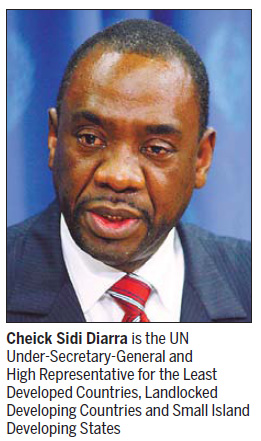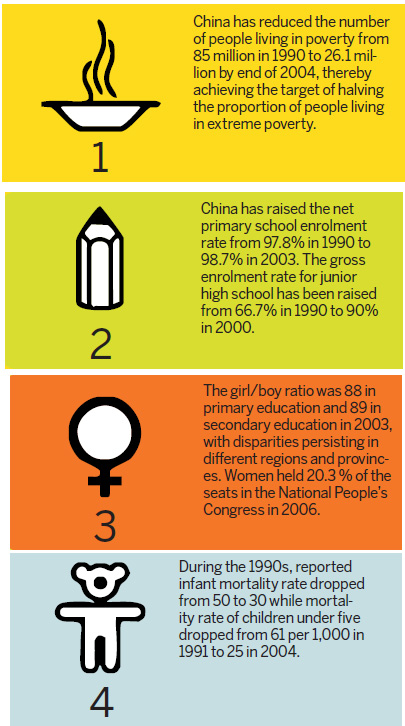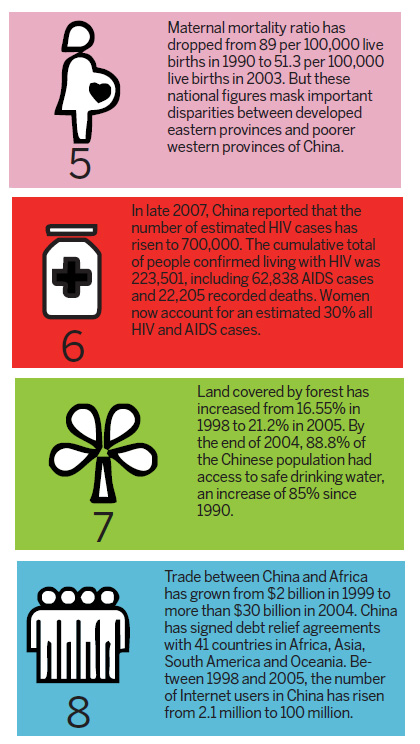Focus
More actions needed to sustain MDG progress
By Zhang Yuwei (China Daily)
Updated: 2010-09-22 08:12
 |
Large Medium Small |
|
Children drinking clean water from a newly-installed water tap. Yu Ji / for China Daily |

China and India have helped reduce global poverty levels
UNITED NATIONS - Exactly 10 years ago, 189 heads of state gathered at the United Nations Millennium Summit in New York. They agreed to achieve a group of eight development goals from slashing poverty, expanding primary education, combating diseases such as HIV, malaria and AIDS, to boost global partnership for development. They set a deadline for these goals - 2015.
With only five years left, 139 world leaders are meeting at the Millennium Development Goals (MDG) Summit (Sept 20 to 22) to review the progress and renew their commitment and give this historic promise a final push.
In an exclusive interview with China Daily, Cheick Sidi Diarra of Mali, UN Under-Secretary-General and High Representative for the Least Developed Countries, Landlocked Developing Countries and Small Island Developing States (OHRLLS), reviewed the progress that has been made, such as China's effort in poverty reduction, and expressed concerns about countries that are still lagging behind, including African countries and the least developed countries (LDCs).
"In general, the MDGs have made a lot of progress since the adoption in 2000, especially in some Asian countries because of economic growth," said Diarra. "In terms of poverty reduction (MDG Goal 1), countries like China and India have impacted on the global number."
According the 2010 MDG Report issued by the UN in June, the fastest growth and sharpest reductions in poverty continue to be recorded in East Asia. China and India have contributed to the large reduction in global poverty.
Target 1 in Goal 1 aims to cut in half, between 1990 and 2015, the proportion of people whose income is less than $1 a day.
"It was good that we had the benchmark, and it was the benchmark at the lower end, not the optimum solution because most of the middle-income countries have already reached the MDG targets. But it was meant for low-income countries, especially the least developed countries and African countries," Diarra said.
The United Nations Development Program (UNDP) said that China has now achieved the target of halving the number of poor people from the 1990 figure of 85 million.
Despite China's noticeable progress in poverty reduction, Diarra said the challenge for the country now is to meet the environmental targets (Goal 7).
"Some progress needs to be done in this area. But I think the problem is due to the size of the population of the country," he said, adding that the standard of living is improving for the average Chinese, which in turn has an impact on the style of living and contributes to the cause.
"This results in either you import a lot or grow a lot in the country. The latter puts a lot of pressure on the environment," he said.
"This has to be managed very delicately because on one hand you have to meet the minimum needs of the population, and on the other hand, you are working on achieving the goals," he said.
"My recommendation would be sustainable management of natural resources for the longer term. It would be a good policy for China in order to meet Goal 7 (ensuring environmental sustainability)."
Although the MDGs have made a real difference in many countries, unfortunately African countries are lagging behind in many target areas.
"The situation is worse in the LDCs (a group of 49 least developed countries in the world). They are lagging behind African countries," Diarra said, adding that financial and technical resources are among the things that are lacking.
For African countries, Goal 1 (eradicating extreme poverty and hunger) hasn't been successful, said Diarra, who is also the UN special advisor on Africa.
According to the UN, although the poverty rate in East Asia has decreased from 60 percent to 16 percent, it stayed above 50 percent in sub-Saharan Africa despite improvements in primary education enrollment.
"China has shown an impressive number in poverty reduction. How did they do it - that is something that can be learned by African and LDC countries," he said, adding that the increasing population is one factor that affects African countries' economic growth.
Among the eight goals, Goal 5 is focused on improving maternal health, which aims to reduce the maternal mortality ratio by three quarters between 1990 and 2015. Although there has been some progress, the Report shows that the rate of reduction is still well short of the 5.5 percent annual decline needed to meet the Goal.
"Here we need strong political will from leaders from the concerned countries. Also, strong support needs to be given to the international community," Diarra said.
Diarra believes that official development assistance (ODA) can contribute a lot to Africa and LDCs in the MDGs. But with most donor countries (including European countries and OECD countries) now facing new realities such as the financial crisis, the ODA has been declining.
At the Gleneagles Summit in 2005, G8 leaders promised to increase aid to developing countries by about $50 billion by 2010. Nearly $25 billion of the amount will go to Africa.
However, the MDG Report pointed out the shortfall in aid, which affects Africa in particular. It is estimated that Africa will receive only about $11 billion out of the $25 billion increase, due mainly to the under-performance of some European donors.
While recognizing ODA will still be much needed by Africa and LDCs at least in the short term, Diarra suggested to "head toward foreign direct investment" to create employment in these countries. This will also help improve employment among youth, which he sees as another challenge ahead for many countries.
"There are things that can be done without costing a dime to the donor countries and which will be of help to the LDCs and Africa. For example, creating incentives for the private sector to come to invest in these countries (linked to the attainment to the MDGs)," he said, adding that the creation of the China-Africa Development Fund in 2007 was a good example of this.
In 2007, China launched the China-Africa development fund to the value of $1 billion to encourage, finance and support Chinese companies in their investments across the African continent.
"Other countries should follow suit," he said.
In a time of different crises the world is facing, including climate change, food security, and economic downturn, it has made it more challenging to achieve all these goals.
"All these crises are intertwined, and they all have negative impacts," he said.
"But I hope to see world leaders to reaffirm the political will, to learn from the successes and failures of their peers, and from there, to give a final push at the national level to achieve the goals," Diarra said, adding that it is key for the world leaders to "deliver on the promise" in the next five years.
China Daily


